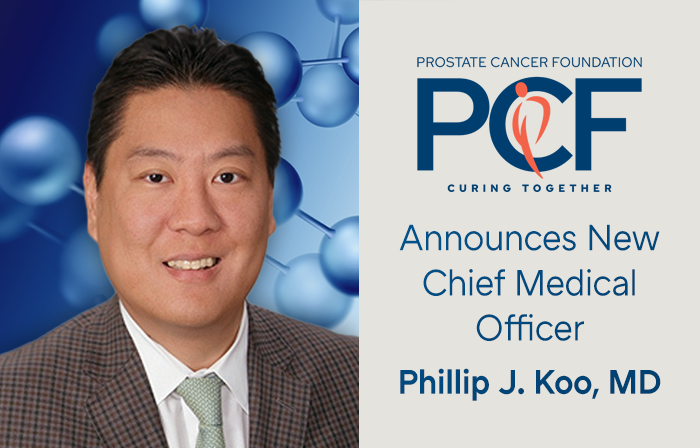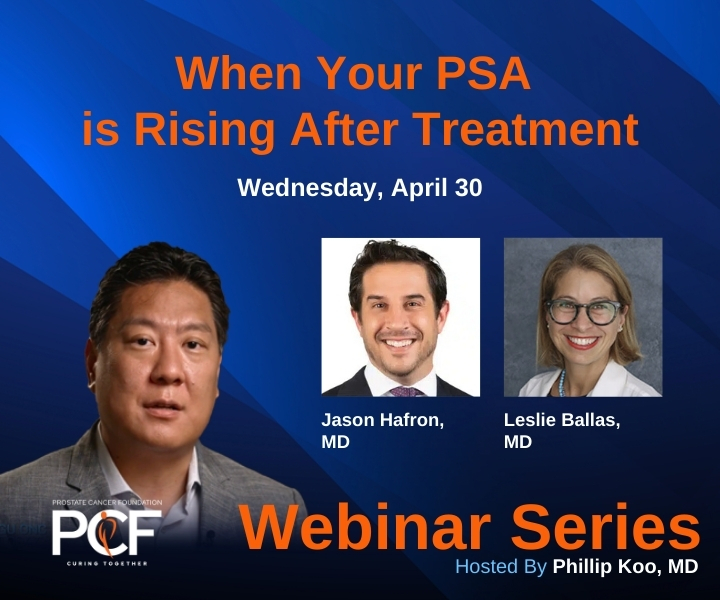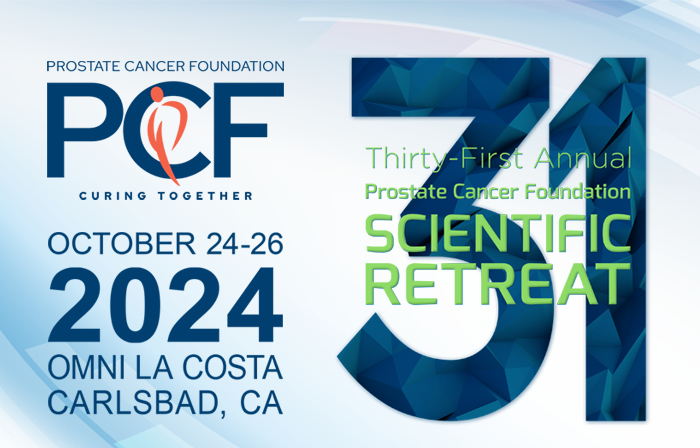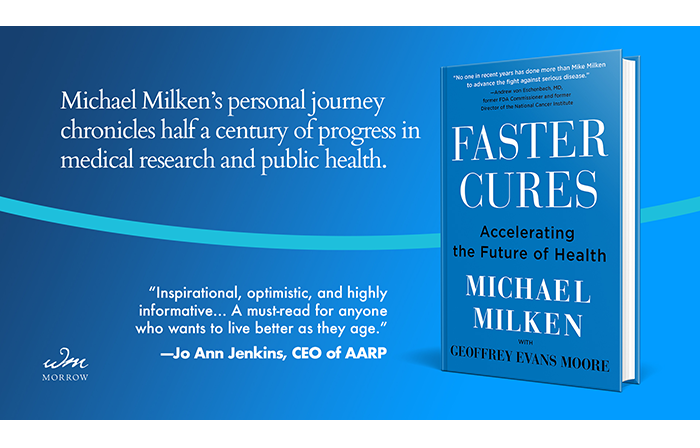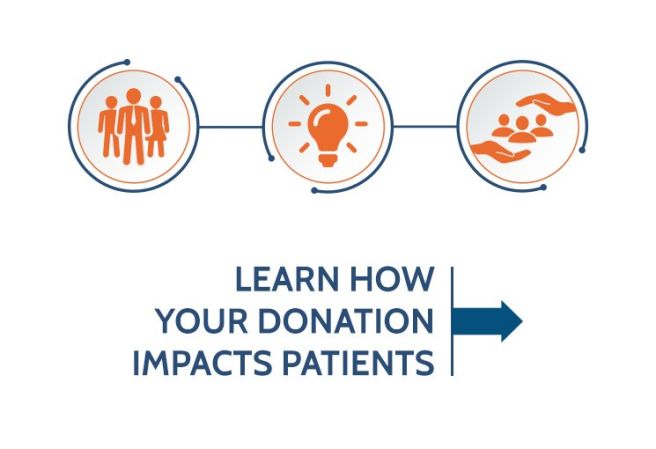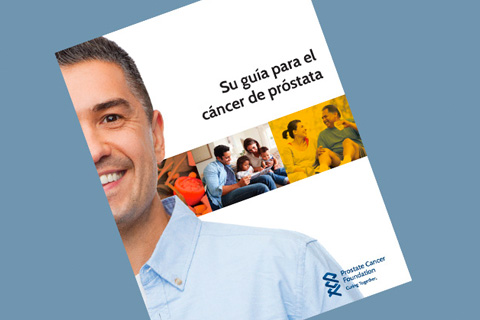-
- About Prostate Cancer
- About Prostate Cancer
- What is Prostate Cancer
- Prostate Gland
- What is BPH?
- Prostatitis
- How Prostate Cancer Grows
- The Prostate-Specific Antigen (PSA) Test
- Prostate Exam
- Symptoms and Signs
- Survival Rates
- Prostate Cancer Causes
- Prostate Cancer FAQs
- Diagnosis and Staging
- Screening and Early Detection
- How is Prostate Cancer Diagnosed?
- Prostate Cancer Staging
- Gleason Score & ISUP Grade Group
- Newly Diagnosed
- Localized or Locally Advanced Prostate Cancer
- Risk Groups
- Black Men: Know Your Risk
- Prostate Cancer Metastases
- PSA Rising
- What to Ask When Your PSA Is Rising After Initial Treatment
- Advanced Prostate Cancer
- Prostate Cancer Treatment
- Radiation Therapy for Prostate Cancer
- Surgery for Prostate Cancer
- Active Surveillance
- Hormone Therapy
- Types of Hormone Therapy
- Chemotherapy for Prostate Cancer
- Precision Therapies for Prostate Cancer
- Immunotherapy for Prostate Cancer
- Choosing a Treatment Option
- Side Effects
- Prostate Cancer Side Effects
- Urinary Dysfunction
- Bowel Dysfunction
- Erectile Dysfunction
- Infertility
- Hormone Therapy Side Effects
- Radiation Therapy Side Effects
- Surgery Side Effects
- Chemotherapy Side Effects
- When to Seek Help
- Patient Resources
- Patient Resources
- Patient Navigation
- Guides
- Find a Provider
- For Caregivers
- Treatment Centers
- Prostate Cancer Clinical Trials
- Financial Resources
- Support Groups
- Patient Webinars
- Patient & Caregiver Virtual Summits
- Family Cancer Risk
- Black Men: Know Your Risk
- Prostate Cancer Risk Factors
- When to Get Checked for Prostate Cancer
- Screening
- Genetic Testing for Prostate Cancer
- Prostate Cancer Prevention
- The Right Track: Precision Resources
- Living with Prostate Cancer
- Exercise for Prostate Cancer
- Prostate Cancer Diet
- Mental Health
- Sexual Health After Treatment
- Patient Stories
- Share Your Own Story
- Wellness Wednesday eNewsletter
- Featured
![Blog]() PCF’s blog covers a wide range of topics.
PCF’s blog covers a wide range of topics. - Featured
![Guides]() The latest prostate cancer research info.
The latest prostate cancer research info.
- News
- Science & Impact
- Science & Impact
- The Work We Fund
- Challenge Awards
- Creativity Awards
- Young Investigator Awards
- TACTICAL Awards
- Recognition Awards
- VA Partnership
- — PCF-VA Centers of Excellence
- — PCF-VA Nursing Initiative
- The Precision Medicine Revolution
- Genetics and Prostate Cancer
- How We Do It
- 2018 Impact Report
- For Researchers
- Funding Strategy
- Open RFA/RFPs
- Award Committee
- Scientific Advisory Board
- Physicians Portal
- The 32nd Annual Scientific Retreat
- 31st Annual Scientific Retreat Video Replays
- Coffey – Holden Prostate Cancer Academy
- Webinars
- Featured
![32ndRetreat_WebMenuImg(262×148)]() The 32nd Annual Scientific Retreat
The 32nd Annual Scientific Retreat
- Take Action
- Take Action
- Stay Informed
- Donate
- Become a Monthly Donor
- Send an eCard
- Donate Through Your Investment Planning Portfolio
- Planned Giving & Estate Planning
- Memorial Donations
- Movember + PCF
- Home Run Challenge
- Golf Programs
- Shop at our Store
- Prostate Cancer Awareness Month
- Support PCF in Your Workplace or Community
- Support Our Partners
- Become a Partner
- Featured
![82 Percent]() Why Give to PCF
Why Give to PCF - Featured
![ecards]() Send an eCard
Send an eCard
- About PCF
- Contact Us Press En Español
Home
Phillip Koo, M.D. Appointed PCF's Chief Medical Officer
The Prostate Cancer Foundation (PCF) today announced the appointment of Phillip Koo, M.D., as chief medical officer. Dr. Koo will lead PCF’s patient navigation programs, help increase understanding and reduction of critical patient care gaps, and accelerate novel programs designed to fulfill PCF’s mission of ending death and suffering from prostate cancer. Dr. Koo brings extensive expertise in prostate cancer diagnostics, imaging and drug development following more than two decades in academic and clinical roles.
Read MorePhillip Koo, M.D. Appointed PCF's Chief Medical Officer
The Prostate Cancer Foundation (PCF) today announced the appointment of Phillip Koo, M.D., as chief medical officer. Dr. Koo will lead PCF’s patient navigation programs, help increase understanding and reduction of critical patient care gaps, and accelerate novel programs designed to fulfill PCF’s mission of ending death and suffering from prostate cancer. Dr. Koo brings extensive expertise in prostate cancer diagnostics, imaging and drug development following more than two decades in academic and clinical roles.
Read MoreNew Resource: Prostate Cancer & Inherited Mutations-What You Should Know
Changes in genes passed down from your parents can affect risk of developing prostate cancer, how fast the disease may spread, and treatment selection. Learn who should consider testing and how testing works.
Get the GuideBREAKING NEWS: Therapy 177lutetium-PSMA-617 (Pluvicto®) Approved
Therapy 177lutetium-PSMA-617 (Pluvicto®) was approved by the FDA for people with advanced prostate cancer who have been treated with androgen receptor pathway inhibitor (ARPI) therapy.
Learn MoreWebinar: April 30- When Your PSA is Rising After Treatment
You’ve been through treatment for prostate cancer. Months or years later, you get the news you hoped would never come: your PSA is rising. Learn from experts in radiation oncology and urology about what the numbers mean, how rising PSA is evaluated, and treatment options.
Learn More and RegisterNow Available: The State of Science Report
The 2024 State of Science Report has been published. The report summarizes the scientific presentations from the 2024 PCF Annual Scientific Retreat held this past October. Learn about the latest top prostate cancer research advances.
Learn MoreDonate to Fight Prostate Cancer
By the time you read this page, another man will be diagnosed with prostate cancer. It happens every 3 minutes. There's no better time than now to take action in the fight against prostate cancer.
Trusted By :
Choose donation amount:
Get the Free Prostate Cancer Guide
We are in a race for patients. For your husbands and fathers. For your sons ... and now your daughters.
Precision Oncology, Nursing, and World-Class Care for Veterans
Learn how your donation impacts patients
Researchers Identify a New Subtype of Advanced Prostate Cancer
A PCF-funded study published in the prestigious journal Science has identified a new subtype of castration-resistant prostate cancer (CRPC). Understanding how genes and proteins “drive” this particular type of cancer may lead to new treatments. In...
Advanced Prostate CancerFrom the LabPlant-Based Diets and Prostate Cancer
“Plant-based” foods are increasingly on the radar. You can grab a green juice at most chain coffee shops, a decent salad at airport restaurants, or a meat-free veggie burger at some locations of the major burger...
DietNutritionDoes Testosterone Cause Prostate Cancer?
As men age, their testosterone levels can fall: by one estimate, 39% of men aged 45-85 have blood testosterone levels considered low (less than 300 ng/mL). Many have no symptoms, but some men may experience symptoms...
Questions for Your Treatment TeamSexual HealthLiquid Biopsy: Catching Cancer Cells in the Blood
Snapshot of Cancer Metastatic prostate cancer looks a lot different from cancer that is confined to the prostate. That’s because over time, as it develops the ability to spread beyond the prostate, cancer undergoes specific mutations....
Get More Information
Receive PCF news in your inbox
Prostate Cancer Symptoms and Signs
If you’ve recently been diagnosed with prostate cancer, you may be asking yourself if there were warning signs or symptoms you should have noticed earlier. So...
Now Available: A Prostate Cancer Guide in Spanish

In 1993, PCF created a Competitive Awards program that revolutionized the evaluation and funding of prostate cancer research. Fortune magazine credited PCF with creating the “modern venture philanthropy” model for cancer research—citing the transformative power of PCF’s short grant applications and rapid funding. The awards empowered many young scientists to fill the pipeline...
For Researchers
The Prostate Cancer Foundation (PCF) is the world’s leading philanthropic organization dedicated to funding life-saving prostate cancer research. Founded in 1993 by Mike Milken, PCF has been responsible for raising more than $1 billion in support of cutting-edge research through more than 2,250 research projects at 245 leading cancer centers, with a global footprint spanning 28 countries. Since PCF’s inception, and through its efforts, patients around the world are living longer, suffering fewer complications, and enjoying better quality of life. PCF is committed to the mission of ending death and suffering from the disease.
Learn more about our foundation









